Pengaruh Rutinitas Membaca Al-Qur’an Terhadap Kecerdasan Spiritual Santri Kelas Ix Mts Pondok Pesantren Madinatunnajah Jombang Ciputat
DOI:
https://doi.org/10.33853/jm2pi.v3i1.507Keywords:
Qur'an Reading Routine Program, Intelligence, SpiritualAbstract
The Qur'an is a holy book that is used as a guide for the life of Muslims around the world. Reading the Qur'an regularly can soothe the heart and soul and improve the work of the brain. This research was conducted at MTs Madinatunnajah Jombang Ciputat with the aim of determining the influence of the routine of reading the Qur'an on the spiritual intelligence of class IX students at MTs Madinatunnajah Jombang Ciputat. This type of research uses quantitative research methods with simple linear regression analysis. The population in this study of all class IX was 161 students. The samples in this study were classes IX A and IX B totaling 62 students/ students, using the Slovin formula calculation. The results of this study show that there is a significant influence between the variables of the routine of reading the Qur'an on the spiritual intelligence of students. This can be followed from a thorough analysis of data on the routine of reading the Qur'an with an average value of 81.87, a median of 83.00, a standard deviation of 6.061. As for the spiritual skills of students with an average value of 84.48, a median of 84.50, and a standard deviation of 8.995. From the calculation thoroughly obtained the result r table 0.2108, r count 0.500. Since r counts greater than r the table then the hypothesis is acceptable, meaning that there is a significant influence.
References
Abuddin Nata, Filsafat Pendidikan Islam (Jakarta: Logos Wacana Ilmu, 1999), h.53.
Ahmad Syarifuddin, Mendidik anak membaca, menulis dan mencintai Al-Qur'an, (Jakarta: Gema Insani, 2008), h.45
Ahmad Taufik, Melejitkan SQ dengan Prinsip 99 Asmaul Husna,(Jakarta: Gramedia Pustaka Utama,2009), h.6
Aziza, N. (2017). Metode Penelitian Metode Penelitian. Metode Penelitian Kualitatif, 43.
Danah Zohar dan Ian Marshal , SQ : Kecerdasan Spiritual, Penerjemah: Rahmani Astutti (Bandung: Mirzan, 2007), h.3.
F.J Monks, Siti Rahayu, Psikologi Perkembangan, (Yogyakarta: UGM Press, 2006), h.123.
Haikal H.habibillah, Ajaibnya Asmaul Husna Atasi Masalah-masalah Harianmu, (Yogyakarta: Sabil, 2013), h.143.
Han, E. S., & goleman, daniel; boyatzis, Richard; Mckee, A. (2019). Hubungan antara kecerdasan emosional dengan prestasi belajar pada siswa kelas II Madrasah Aliyah Negeri (MAN) Pamekasan. Journal of Chemical Information and Modeling, 53(9), 1689–1699.
Hartono, Kamus Praktis Bahasa Indonesia, (Jakarta: PT.Rineka Cipta, 1996), h. 17
Lucyani, D. fryda. (2009). Journal Information, 10(3), 1–16.
Mangkunegara. (2017). Landasan Teori. Landasanteori.Com, 2012, 72. http://www.landasanteori.com/2015/09/pengertian-kreativitas-definisi-aspek.html
Muhammdad Djarot Sentosa, Komunikasi Qur’aniyah, (Bandung: Pustaka Islamika, 2005),h.31.
Republik Indonesia, Undang-Undang Republika Indonesia Nomor 20 Tahun 203 Tentang Sistem Pendidikan Nasional, Bab II,pasal 3.
Syaifudin Aman, Tren Spiritual Milinium Ketiga, (Bandung: Ruhama, 2013), h.23.
Tengku Muhammd, Sejarah dan Pengantar Imu Al-Qur'an, (Semarang: Pustaka Rizki Putra, 2006), h.8
Tim Redaksi , Kamus Besar Bahasa Indonesia , (Jakarta: Balai Pustaka, 2000 ), h.180
Tim Redaksi , Kamus Besar Bahasa Indonesia, ibid, h.83
Wahyudi Siswanto, Membentuk Kecerdasan Spiritual Anak, (Jakarta: Amzah, 2012), h. 10-11
Zakiya Darajat, Ilmu Jiwa Agama, (Jakarta: Bulan Bintang, 1993), h.64.





